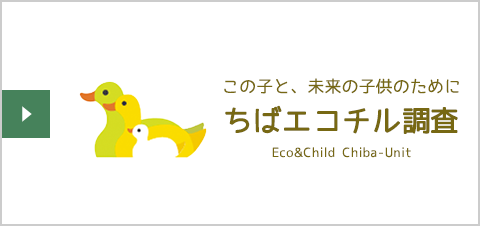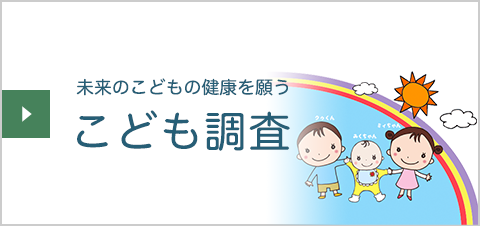Sustainable Health Science
In the field of sustainable health science, the Center administers multiple cohort studies. The constitution of people themselves (genetic factors) and their lifestyles and the surrounding environment (environmental factors) have a complex relationship with people’s health. An abundance of research is being pursued on the influence of that relationship, which has yet to be fully clarified. Research whose target is a single point in time is not enough for examining the influence of the environment on people. As such, it is necessary to observe the environment and the health condition of the people within it over time. This is the perspective from which cohort studies are administered. As children whose minds and bodies are in the development stage are especially prone to being influenced by their environment, people both in and outside Japan are taking an interest in the influence that environmental changes in recent years have had on health. Additionally, in recent years, the “Developmental Origins of Health and Disease” (DOHaD) theory, which surmises that the environment of fetal period and early life affects the later life health conditions, and “life course medicine,” which approaches the life of a person in its entirety, are being advocated, the health effects of the environment have been considered to be important from even before birth through all life stages.
Based on this context, the Center engages in two forms of birth cohort studies in the field of sustainable health science. Among environmental factors, we especially focus on environmental contaminants, and perform measurements of organic pollutants and heavy metal concentration in human bio samples. The Center ascertains each individual’s state of exposure to environment contaminants and examines its link to health for each growth stage of children.
Japan Environment and Children’s Study (JECS)
The Center for Preventive Medical Sciences at Chiba University conducts surveys as the Chiba Regional Centre for the “Japan Environment and Children’s Study” (JECS), funded by the Ministry of the Environment of Japan. At Chiba Regional Centre, approximately 6,000 groups of children and their parents are registered to participate in JECS. Many new findings have been published.
“C-MACH” (Chiba Study of Mother and Child Health):
C-MACH is a birth cohort study conducted independently by Center for Preventive Medical Sciences of Chiba University. After initiating the study in 2014, the Center registered the participation of pregnant mothers with the cooperation of medical institutions in the prefectures of Chiba and Saitama. The survey currently has approximately 400 participating groups of mothers and children, and remains ongoing. Through C-MACH, the Center collects and stores various biological samples that include blood and urine, and performs analysis on them while conducting joint research with other research institutions. The second phase of C-MACH began enrollment of pregnant women and their partners in 2021.
The Center currently engages in joint research for C-MACH with the following institutions: In Japan, Waseda University, the University of Tokyo, Kagawa Nutrition University and Niigata University of Pharmacy and Applied Life Sciences; overseas, Massachusetts General Hospital (US), University of California San Francisco (US), National Taiwan University (Taiwan), and others.
Study on children’s lifestyles and health in a world with COVID-19:
In the aftermath of the spreading of COVID-19, the living habits of children changed dramatically, creating concerns about the effects on their physical and mental well-being. Given that situation, a study targeting children in all grades at the Elementary School attached to Faculty of Education, Chiba University commenced in December 2020 to study about the relationship between those changes of children’s living habits and health condition. Three hundred and fifty-five children are enrolled in this study. This study includes periodical measurements of physique and bone density and blood tests in addition to questionnaire surveys and measurement of activity amounts.
Analytical chemistry:
Using mass spectrometers, the Center performs measurements of polychlorinated biphenyls (PCB) and other environmental chemical substances that exist in biological and environmental samples obtained through cohort studies. We analyze the relationship between the concentrations of chemical substances measured and health indicators of study participants as we attempt to identify substances with the potential to influence those health indicators.
Additionally, in recent years, the Center has also been taking on the challenge of the comprehensive analysis of bioactive substances in human, and has also been tackling the analysis of the relationship between exposure to chemical substances and changes in metabolism in human. Through doing so, we believe that we can gain clues for elucidating what is transpiring from the time of exposure to chemical substances to the time that effects are manifested, which had been a black box of sorts up to this point.
EGUCHI AkifumiLecturer
YAMAMOTO MidoriLecturer
HISADA AyaAssistant Professor
KAWANAMI AkikoSpecially Appointed Researcher
SAGARA NaoyaSpecially Appointed Researcher
SHIMOJO NaokiProject Researcher



